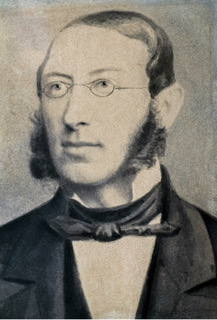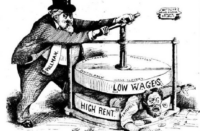Weerth, the German proletariat’s first and most important poet, the son of Rhineland parents, was born in Detmold, where his father was church superintendent. In 1843, when I was in Manchester, Weerth came to Bradford as an agent for his German firm, and we spent many a pleasant Sunday together. In 1845, when Marx and I lived in Brussels, Weerth took over the continental agency for his firm and arranged things so that he, too, could make Brussels his headquarters. After the revolution of March 1848, we all met in Cologne to found the Neue Rheinische Zeitung. Weerth took on the feuilleton, and I don’t think any other paper ever had one as hard-hitting and funny.”
Engels in 1883 on his friend Georg Weerth.
Having met Engels in Manchester, and closely allied with Marx and the Chartist leaders, Georg Weerth came to understand the misery of the working class as the reverse side of enormous technical progress, and also that this class was destined to overthrow capitalism.
In Weerth’s short story “The Flower Festival of English Workers,” for the first time in German literature a new image of humanity emerges directly from the experience of the fighting proletariat: workers as class-conscious, fighting people with a developed aesthetic sense. The story ends:
But in the inn “Zur alten Hammelsschulter” [the Old Mutton Shoulder] they opened the windows, for the night was too delicious. The stars twinkled so cheerfully, as if they were rejoicing over the poor small people down there on earth, over the workers in Yorkshire who, despite all the tyranny celebrate such splendid poetic festivals.
Yes, poetic festivals!—For a flower festival of English workers . . . is of all the greater importance because it has sprung from the people without any outside cause. This is proof that workers, in addition to their political development, have preserved in their hearts a treasure of warm love for nature, a love which is the source of all poetry and which will one day enable them to propel a fresh literature, a new, mighty art into the world.
Weerth captures the inherent power of the proletariat as an industrial, militant as well as aesthetic capacity, a power of the future.
In his poem “Industry,” Weerth articulates the dual character of capitalist industry: on the one hand, “She sits upon the darkest throne | . . . The poor she drives to temple cold!” At the same time it is she who produces the weapons for liberation: “And they who forged the sword and chains, | Will use the sword to smash the chains!”
Liberated, industry takes on a new character, and she herself appears as the precondition of her own liberation: “Transformed, the goddess dark appears | . . . She rid the rock and made us free!”
Ultimately this struggle for liberation is the prerequisite for a free society, in which freedom achieves the unleashed sensuality of humanity: “And nature with enthralling kiss | Lures the living to greater bliss!”
Like “The Flower Festival of the English Workers,” Werth’s poetry goes beyond the depiction of misery, showing the class-conscious working class, its humanity and strength. His poem “They Sat on the Benches” is about the reaction of English workers to the Silesian weavers’ uprising:
They sat along the benches, They sat around their board, The beer was poured in plenty They drank with pleasure deep. They knew no heavy sorrow, They knew no ache nor woe They knew not past nor future, They only lived this day. They sat below the alder— Great was summer’s frill. Wild and angry lads From York and Lancashire Their song was rough and throaty, They sat until late night They listened to the tale “Of Silesian weavers’ fight.” And when they knew it all,— They almost were in tears. The sturdy lads leapt up And urgent was their sense. They clenched their fists in anger, Their hats waved stormily; Meadows and woods resounded: “Good Luck, Silesia!”
In this vivid account Weerth depicts confident proletarians enjoying the day sensuously yet with an internationalist grasp of their common cause with the Silesian weavers. Both poems are written from the viewpoint of the struggling proletariat, conscious of their power and eventual victory; and the poems reinforce this class-consciousness.
Humorous Sketches from Contemporary Commercial Life is Weerth’s most mature prose work. The capitalist Preiss has only one concern: money. Here all humanity ceases. His encounter with the March Revolution in Germany turns Preiss into a comic figure. He dreads the revolution, which threatens his commercial concerns; he adapts to the changing fortunes of the times, always conscious of his financial interests, and ultimately reckons with a ministerial post. The sketch ends: “Upon the completely unfounded rumour that Mr Preiss was to become prime minister, raw proletarians threw in his windows that very evening.”
In February 1848 Weerth went to Cologne and worked for the Neue Rheinische Zeitung, edited by Marx. The feuilleton genre became a tool for Weerth in the political struggle.
Weerth’s most famous political satire, “The Life and Deeds of the Famous Knight Schnapphahnski,” targets the Prussian squirearchy (Junkerism) and its counter-revolutionary machinations, based on one Lichnowski. Engels tells of his fate:
On September 18, 1848 Schnapphahnski-Lichnowski rode out with the Prussian General von Auerswald (also a member of the assembly) to spy on peasant detachments on their way to join the fighters on the Frankfurt barricades. Both he and Auerswald were, deservedly, put to death by the peasants as spies.
The Schnapphahnski novel ends: “We would perhaps still be laughing about it if the bullet-torn corpses of the proletarians of Paris, Vienna and Berlin did not grin at us.”
After the counter-revolution Weerth resigned and began to work in commerce again, dying of yellow fever in Havana, aged only thirty-four. With amazing foresight, he wrote to Heinrich Heine that Cuba “would be the field where the great conflicts of the new world would be fought out first.”
■ So far only one translation of Weerth’s work exists in English, the Seven Seas (GDR) publication A Young Revolutionary in Nineteenth Century England: Selected Writings of Georg Weerth (1971).






